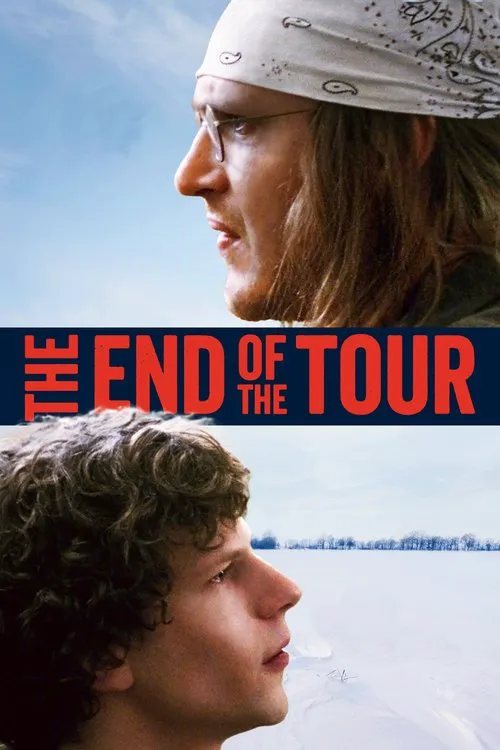The End of the Tour

Plot
In the summer of 1996, acclaimed author David Foster Wallace had just unleashed his magnum opus, 'Infinite Jest,' on an unsuspecting literary world. The novel's groundbreaking narrative, weaving together a complex tapestry of philosophical introspection, dark humor, and poignant character studies, quickly captured the attention of critics and readers alike. Rolling Stone journalist David Lipsky, tasked with reviewing the novel for his publication, set out on a five-day journey to interview Wallace, capturing the nuances of their conversation and shedding light on the enigmatic author's creative process. The film 'The End of the Tour' takes viewers through these five pivotal days as Lipsky attempts to grasp the magnitude of Wallace's creative vision and decipher the intricacies of his artistic genius. As the interviewer, Lipsky struggles to pin down the elusive Wallace, who proves to be an articulate, self-aware, and refreshingly honest conversationalist. Through their exchanges, we gain insight into the development of 'Infinite Jest' - a sprawling narrative that tackles everything from addiction, loneliness, and the pursuit of entertainment, to the existential implications of the search for human connection in a postmodern, hyper-consumerist society. From the outset, it's clear that Lipsky is both fascinated and intimidated by the mercurial Wallace. Their initial meeting is cordial but stilted, with Wallace immediately pushing the conversation in unexpected directions. He challenges Lipsky's preconceptions about his writing and his own place within the literary landscape, laying bare his insecurities and anxieties about being a public figure. Walls of defense begin to break down as the two men engage in candid discussions about art, identity, and the search for meaning. Throughout their conversations, Wallace effortlessly glides between topics, demonstrating a vast understanding of literature, history, and philosophy. His observations are peppered with witty humor and poignant introspection, making him both a compelling conversationalist and an intellectually curious observer of the human experience. Lipsky, meanwhile, finds himself increasingly enthralled by Wallace's unflinching candor and the boundless scope of his imagination. One of the film's most compelling aspects is its nuanced portrayal of the creative process. By witnessing Wallace's deliberations about his work, we gain a unique glimpse into the inner workings of an author's mind. It's clear that he's struggling to balance his artistic vision with the external pressures of commercial success and the expectations of his readers. His conversations with Lipsky reveal a complex web of creative doubts, hesitations, and fears that underpin his writing, as well as a remarkable capacity for self-reflection and introspection. Their journey across the Midwest - Wallace has invited Lipsky to join him on a book signing tour - becomes a metaphor for the fragility of human connection in a chaotic world. As they traverse highways, hotel rooms, and crowded auditoriums, they engage in an existential dialogue about the state of the world and our place within it. It's a conversation that's equal parts melancholic and uplifting, reflecting the contradictions and complexities of Wallace's own vision. Throughout the five-day conversation, Walls also grapples with his own insecurities as a writer and a critic. He struggles to articulate a clear perspective on Wallace's work, and at times, he feels overwhelmed by the vastness of his subject's ideas. This self-doubt creates a sense of empathy and identification between the two men, as they commiserate about the difficulties of putting words to page and the crushing pressures of creative expectation. Ultimately, 'The End of the Tour' is a meditation on the fragility of human connection and the elusiveness of creative expression. Through its nuanced portrayal of Wallace and Lipsky's conversations, the film captures the boundless complexity of the human experience, revealing a universe of thought, emotion, and artistic expression that's both deeply personal and universally relatable. By the time the five-day interview comes to a close, we're left with a profound appreciation for the creative struggles of both authors, as well as the ephemeral nature of human connection in a rapidly changing world.
Reviews
Vincent
What terrifies you most is the feeling that you understand everything he says, that you're undoubtedly kindred spirits, having experienced the same pain, harbored the same hopes. And yet, he's dead. Dead by his own hand. How many more times must you discover such damning evidence of failure? How many more chances do you have left to prove that there's no way forward, and no turning back?
Adeline
Reminiscent of Linklater's talky films. Two writers meander and chat, their deeply insightful conversations flow like an intermittent stream, filled with both sharp probing and understanding compassion. I've always felt that Jesse Eisenberg is the kind of actor who sparks even more when paired with male co-stars.
Recommendations




